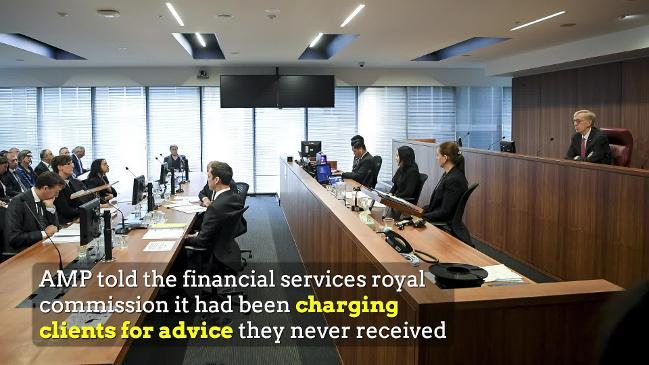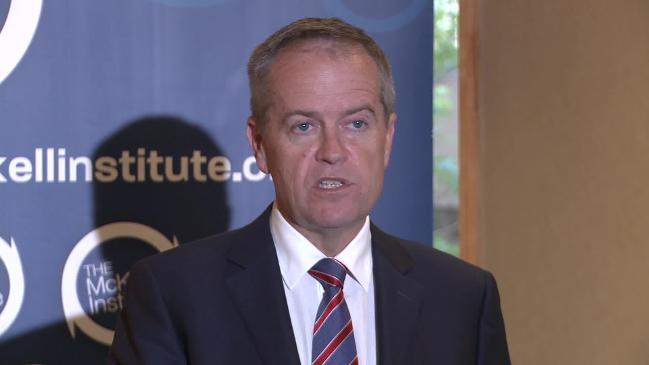Terry McCrann: hysteria demanding departure of Catherine Brenner is like a witch hunt
AMP chair Catherine Brenner quit on Monday and group counsel Brian Salter was sacked, but the external baying for blood doesn’t allow for natural justice, writes Terry McCrann.

Terry McCrann
Don't miss out on the headlines from Terry McCrann. Followed categories will be added to My News.
ONLY goal — or, if you prefer, gaol — time? Surely, the witch should be burned at the stake? She’s female. She’s guilty.
After — let’s be fair, we don’t want to jump to conclusions — she’s gone through the appropriate testing to see if and only if she floats when dunked.
The frenzied and indeed hysterical reaction to the departure of AMP chairman Catherine Brenner was simply extraordinary.
And that’s only talking about the commentary from “experienced” and “objective” commentators.
KELLY O’DWYER’S BACKFLIP ON THE ROYAL COMMISSION
AMP COULD FACE CRIMINAL CHARGES OVER SCANDAL
I didn’t venture into the swamp otherwise known as social media.
Now let me state that she had to go and she had to go on Sunday.
In a calmer, saner, world that might have been after or at the AMP annual meeting — where she and her entire board could both have been held properly to account by shareholders and they in turn had the chance to explain if not justify their individual and collective behaviour.
But in the media feeding frenzy which now totally surrounds the banking royal commission plus the reality of AMP’s perilous business situation, Brenner had to fall on her sword immediately.
Let it be clear; she was taking responsibility for the buck stopping at her desk; and it is most definitely not the end of the matter either for her personally, other directors, management and the AMP overall.

As I wrote at the start of the AMP revelations, chairman, directors and top management had “just stepped into a world of pain”. And let me add, entirely appropriately so.
But that most certainly does not mean throwing all sense of context and proportion out the window — burn them all; or, more gently, jail them all and throw away the keys.
Or deny them the opportunity to present their defence — considered narrowly; or to hear explanations of financial services reality, if this RC is actually to achieve a conclusion which makes things better for the future.
The key sentence in the statement from the AMP board yesterday was “the board is satisfied that the former chairman, Catherine Brenner, former chief executive officer Craig Meller and the other directors did not act inappropriately in relation to the preparation of the Clayton Utz report”. This was the report on AMP’s fee-for-no-service scandal, and which went to ASIC.
Now you might reasonably say that the directors “would say that” about — at its most basic — themselves. But it wasn’t actually them “saying it” but three (this time, I think we can conclude they were) independent lawyers, who the board called in to examine the matter.
The other critical point in the statement was that they dumped the entire “issue” in the lap of the — now former — AMP group counsel, Brian Salter, who has been booted immediately and will lose any deferred pay.
Salter in turn responded with his own — well, he would say that — statement that he had not engaged in any wrongdoing.

He made the critical disclosure that the report’s supposed “independence” was not of the AMP in general — and so, not necessarily of board, chairman or himself as group counsel — but of the AMP’s specific “Advice business”.
What’s got completely lost in the frenzy is whether the supposed changes to the report were substantive or unconscionable.
The same applies to the far more serious charge that AMP lied to ASIC 20 times.
Who did the lying and who knew about it? Yes, the board chairman has to take responsibility. But can we also hear if she knew and if she should have known?
Well, this is all going to be litigated, and I do mean litigated: the RC is already a lawyers’ picnic, but is rapidly evolving into the mother-of-all legal banquets. By the time it all finishes, there’ll be very many vineyards moving from the ownership of doctors to that of QCs and down through junior wigs and on to humble solicitors.
In the — more important — bigger context, it is blindingly clear that the RC is going to lead to sweeping changes in regulation and enforcement over banks and the whole financial system.
This will have a direct — and costly — impact on the way every single financial institution operates. There will be sweeping changes to boards of directors and managements.
The sort of frenzy we have seen over the AMP does not bode well for calm, considered, rational — and above all, consumer-effective — changes. A trustworthy and efficient financial system — and financial institutions — are the foundation of your financial wellbeing.
Oh, and that opening sentence: it’s best to stick with the spelling “jail”, when you’re embarked on froth-speckled venting; it avoids writing demands for “goal time”.

TURNING THE SCREW
WE live in a mad, mad world. Alinta has made an offer for a power station that the owner, AGL, has made absolutely clear it has no intention of selling. You might call it “NSW’s Hazelwood” — Liddell.
Mad, not only because it’s an offer for an asset that AGL not only doesn’t want to sell but can’t sell, as a sale — or more specifically, (someone else) keeping Liddell open — would rip the heart out of its future profit. The “reasonable” AGL case is that it intends to replace Liddell with a portfolio of other “generation” assets.
AGL has been arguing it needs the Liddell site to integrate into this portfolio.
The reality is AGL cannot allow Liddell to stay open, thereby putting downward pressure on electricity prices. AGL would prefer to keep screwing its customers.
Alinta cannot force AGL to sell, but the federal — or NSW state — government can. Not sell directly to AGL but to the government.
One of them must do it, one of them should WANT to do it.



